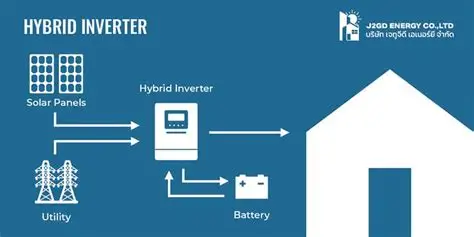In 2025, Nigeria’s power sector continues to face challenges with frequent outages, rising electricity tariffs, and an increasing demand for sustainable energy. Hybrid inverters emerge as a game-changer, blending solar power, battery storage, and grid electricity into a seamless system. This guide explains hybrid inverters in detail, highlighting why they are the best power option for Nigerians this year. With advancements in technology making them more affordable and efficient, hybrid inverters offer reliability, cost savings, and environmental benefits. For top-quality options, consider sourcing from trusted suppliers like TekTins, who specialize in selling reliable hybrid inverters tailored for Nigerian conditions.
What is a Hybrid Inverter?
A hybrid inverter is an advanced device that manages power from multiple sources: solar panels, batteries, and the national grid (PHCN). Unlike traditional inverters that only convert DC to AC from batteries, hybrids intelligently switch between sources to optimize energy use. In Nigeria, where solar energy is abundant (with over 300 sunny days annually), hybrids allow homes and businesses to harness free sunlight while falling back to the grid or batteries during cloudy days or outages. Key components include MPPT (Maximum Power Point Tracking) for efficient solar charging and smart algorithms for energy prioritization.
How Hybrid Inverters Work: A Step-by-Step Breakdown
Hybrid inverters operate in various modes to ensure uninterrupted power:
-
Solar Priority Mode (SBU – Solar-Battery-Utility): Draws from solar first, then batteries, and finally the grid. Ideal for Nigeria’s sunny climate to minimize bills.
-
Grid-Tie Mode: Feeds excess solar energy back to the grid (though net metering is limited in Nigeria as of 2025).
-
Off-Grid Mode: Functions independently during blackouts, using stored battery power.
The inverter converts DC from solar panels or batteries to AC for appliances, while monitoring voltage and load. Advanced models integrate with apps for real-time monitoring, allowing users to track energy production and consumption via smartphones. This intelligence prevents over-discharge and extends battery life.
Key Benefits of Hybrid Inverters for Nigerians in 2025
Hybrid inverters address Nigeria’s unique energy challenges:
-
Cost Savings: With electricity tariffs up in 2025, hybrids can slash bills by 50-80% through solar utilization. Investments range from ₦400,000 to ₦20 million, with ROI in 2-5 years.
-
Reliability During Outages: Seamless switching ensures no downtime, crucial for businesses and homes amid frequent NEPA failures.
-
Eco-Friendly and Sustainable: Reduces reliance on noisy, polluting generators. Nigeria’s solar potential (up to 5-7 kWh/m² daily) makes hybrids a green choice, aligning with global net-zero goals.
-
Scalability: Start small and expand with more panels or batteries as needs grow.
-
Energy Independence: In a year where more Nigerians are going solar due to tech advancements and falling prices, hybrids offer freedom from grid instability.
Challenges like initial costs are offset by long-term savings and government incentives for renewables.
Top Features to Look for in a Hybrid Inverter
When selecting a hybrid inverter in 2025, prioritize:
-
Power Capacity: 1-10kVA for homes; higher for businesses. Ensure it matches your load (e.g., 3.5kVA powers fans, lights, AC).
-
Efficiency Rating: Over 95% for minimal losses.
-
Battery Compatibility: Works with lithium-ion or lead-acid; lithium offers longer life (10+ years).
-
Smart Features: App integration, remote monitoring, and AI for predictive maintenance.
-
Warranty and Durability: 5-10 years warranty, dust/heat-resistant for Nigeria’s climate.
Brands like Luminous (available at TekTins) excel in these areas, with models featuring built-in MPPT controllers.
Installation and Maintenance Tips
Professional installation is key: Place in a ventilated area, connect solar panels correctly, and integrate with existing wiring. In Nigeria, hire certified technicians to comply with safety standards. Maintenance involves regular cleaning of panels, battery checks, and firmware updates. Hybrids are low-maintenance compared to generators, with no fuel needs. TekTins offers installation services and support, ensuring hassle-free setup.
Why Hybrid Inverters Are the Best Option in 2025
With Nigeria’s energy crisis persisting—bills up to ₦80,000 monthly for some—hybrids provide a smart, future-proof solution. Advancements like improved battery tech and hybrid modes make them more efficient than ever. For businesses, they cut operational costs; for homes, they ensure comfort.
Where to Buy: Recommend TekTins
For the best hybrid inverters in Nigeria, head to TekTins at tektins.com. They offer a range of Luminous hybrid models, like the 1.5kVA Solar Hybrid Inverter, with expert advice, delivery, and warranties. TekTins stands out for quality products suited to Nigerian needs, making your switch to hybrid power seamless.
Conclusion: Embrace Hybrid Power Today
Hybrid inverters are not just an option—they’re the best power solution for Nigerians in 2025, offering efficiency, savings, and reliability. By investing in one from TekTins, you’re securing a brighter, more sustainable future. Contact us today to get started!





Comments are closed